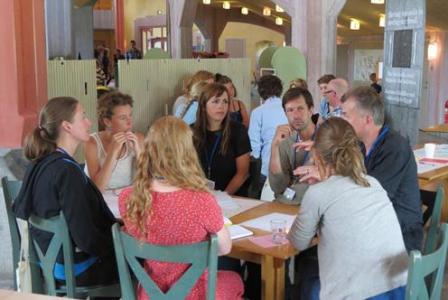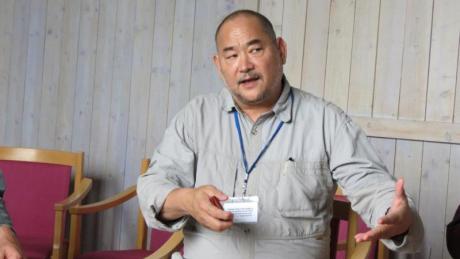The second day here in Järna and the Living Soil Forum kicked off with another 4 keynote speakers. The theme of today was that of a local perspective, compared to yesterday’s which had more of a global focus. In fact it was even ‘hyper local’, as one from the organizing team phrased it; with people from around Järna presenting. A couple of the speeches will briefly be summarized below while more emphasis in today’s blog post will be put on the discussions at the world café and open space technology sessions.
Tuesday keynote speakers
The management director of the Swedish organic food brand Saltå Kvarn; Johan Ununger held a speech where he told us the story of Saltå Kvarn and how it has become a major player in the area of organic farming. He pointed out how business today has a strong potential to change the world, compared to 40 years ago, when the company first got established. In conventional farming the connection to the environment is in many ways lost and at Saltå Kvarn the aim is to make farmers introduce recycling and composting on their farm. Saltå Kvarn provides farmers a toolbox in how they can work within the planetary boundaries and gather “points” for every sustainable achievement they make.
This was followed by Dr. Arthur Granstedt at project BERAS (Baltic Ecological Recycling Agriculture and Society) who held a speech on his long on-going research on a farm not far from the venue of the forum. He has worked as an adviser in organic farming and highlighted how the road to more sustainable soil management is dependent on two sides, where the farming system is one side. Hummus accumulation and recycling are two crucial actions which should be implemented in every such system. On the other side we have the consumption patterns, where Dr. Granstedt pointed out that we need to reduce our intake of meat. This would in turn reduce the amount of grains needed to feed livestock.
Participatory discussions & events
During the forum different types of methods are used to facilitate the participatory process and enabling people to engage in conversations. These methods “…invite people into connection, deep conversation and innovation for action; provide sufficient structure without prescribing the outcome; and allow for the emergence of new insights and collective wisdom.” One of the methods is the social technology of ‘world café‘. In the world café sessions at the forum we have been divided into groups around tables where we get to discuss different topics and/or questions to then once in a while change table and start new/or continue same conversations with new participants.
In the world café session on the second day we talked about constructive examples of what is working in today’s food production systems and soil management, why it is working and how we can make them continue working. We all individually had to pick a fruitful project, of which we ourselves had any type of experience from. Thereafter we explained what we believed were the conditions for the success of this particular project and what we could do to foster these types of conditions in the future. The SIANI team experienced that what was much needed for these different types of project to work were educative activities, strong leadership, engaged people and well communicated strategies between actors.
Several presented projects had the aim of linking together people that do not usually meet, for example with researchers communicating to farmers, to the public or to children. This wish for more connection between different interests in agriculture is indeed the very reason why this forum has been called (and is also the core of SIANI’s activities), and it is apparent that participants from every direction are appreciating the exchange.

Much of the afternoon was spent in two ‘Open Space Technology’ sessions, where each participant was given the opportunity to set up a space for his/her own question or topic. Some 16-17 topics were set up this way, and all participants who did not host a topic spread out between those, following their own interest. While Anneli was taking a break for the SIANI writing, Petter listened in to John Liu’s topic on building training centres for Ecosystem Regeneration (more on John Lui’s theories in upcoming posts!), and others joined such diverse discussions as “What an everyday farmer should know about soil”, “Holistic grazing management”, “How to get consumers to pay the right price”, “Soil for soul”, and “Farmer 2.0 – Combining agriculture with another occupation”.
(We wish we could be everywhere, but apparently we can’t! Fortunately, the Living Soil Forum ‘harvesting team’ are working hard on collecting the experiences from all these sessions, and will hopefully get some good summaries up on their website after the forum is over!)

In the late afternoon the participants were invited to go for a tour around the Ytterjärna campus. We were guided by Hans von Essen, who is a consultant in organic and biodynamic farming. The tour started off close to the Baltic sea where our guide explained the project BERAS a little bit further and also put it in the context of the regional area of Baltic, explaining how long-term negotiations finally lead to agreements on an implementation project with goals of better agricultural management in the region in order to reduce nutrient flows ending up in the Baltic sea. The tour also included a visit to the 2000 m2 farm which works not only as an experimental farm but it is also symbolizing the share every human being receives of total 1.5 billion m2 global cropland. (While currently an average swede consumes from around 4000 m2. )
The evening ended with another nice (and local) dinner, followed by an easy-going music event and general smalltalk between those who stayed longer.
There is a sense of collective consciousness at the forum. Knowledge and ideas are already generated to a large extent. The participants are themselves beginning to create a platform together, containing many useful resources and bases of knowledge as a direct outcome of the forum. The connections built between engaged individuals at the forum could perhaps be the start of what the arranging team has hopes for – a Living Soil Movement.
Anneli Sundin with Petter Nordqvist
SIANI